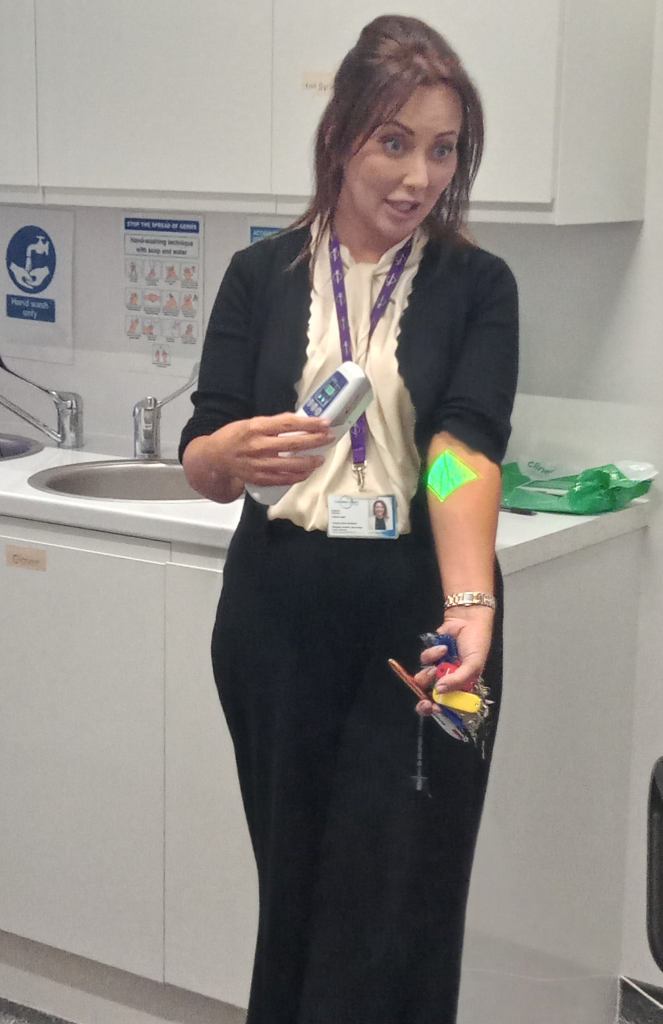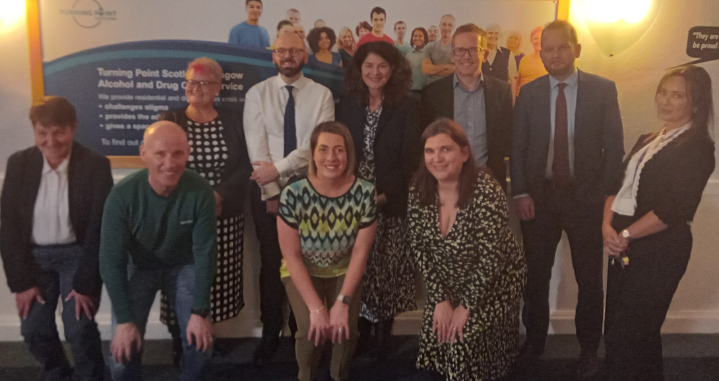The Home Affairs Committee visited Glasgow’s Alcohol and Drug Crisis Service to discuss and observe the work that it does to support persons into recovery, and its use of harm reduction methods.
The Home Affairs Committee is a cross-party committee of MPs responsible for scrutinising the work of the Home Office and its associated bodies. In early 2022, a Drug Inquiry was opened to focus on drug use and the effects on society and the economy with particular focus on the Misuse of Drugs Act (1971). Turning Point submitted written evidence to the inquiry earlier this year.*
Five committee members and the Inquiry manager were welcomed to the service by Patricia Tracey, Head of Alcohol and Other Drugs, Jan Mayor, Practice and Innovation Lead, Jennifer Lang, Service Manager, Thomas Hobbs, Service Manager and Kristine Gilmore, Lead Nurse. The Committee was keen to learn about all services by Turning Point Scotland before an in depth discussion on harm reduction, stabilisation, residential rehabilitation, and the impacts of language and stigma.
This discussion was followed by a tour of the Crisis Service which involved needle exchange, IEP van and the residential area where the committee members spoke with residents who had been given the option to speak with them and share their stories. The residents shared their own experiences and the support given to them by TPS. After the visit, the residents shared what the opportunity to speak to the committee meant to them:
“We felt listened to by the visiting MPs, it’s good for them to hear from us- the people who live this life.”
“We told them how important places like this are so hopefully we start to see some change.”
One resident that left the service the same morning was upset to miss the visit but left a note which Jennifer Lang read out:
“More places like this need to be opened as this is the only one in Glasgow. So many in Glasgow are in crisis. These beds are like gold dust. A lot of staff are in recovery which is great as they have walked in our shoes. I feel a lot of workers in the care field as addicts have a stigma attached.”

Kristen demonstrates AccuVein

The Committee members test AccuVein
The committee thanked Turning Point Scotland for such an informative, thought-provoking, moving and memorable visit. The Members found it immensely valuable and felt very privileged to learn about the amazing work, see the facilities and speak with the people who are provided such important support.
Glasgow Alcohol and Drugs Crisis Service Manager Jennifer Lang reflected on the visit after conversations with the residents involved and said, “It was a pleasure to host the Home Affairs Committee to the Glasgow Alcohol and Drug Crisis Service. It is important for them to be aware of the various treatment options that are available to individuals impacted by alcohol and other drug use in Glasgow. They were also willing to hear about our thoughts on what we felt could be available across the country if legislation wasn’t a barrier. They were open to listening to what we had to say regarding the stigma the people we support face and how the lack of harm reduction options available to them enhance that stigma.”

The Home Affairs Committee members with TPS staff
*Along with the written evidence, Turning Point Scotland’s experts in alcohol and other drugs, justice and policy have focused on reviewing the Misuse of Drugs Act (1971). The key issues of the ongoing debate around drug law reform can be seen in this short film available here.
TPS harm reduction & stabilisation services
TPS Glasgow Alcohol and Drug Crisis Service offers integrated health and social care support, that is low threshold and direct access, for people experiencing a crisis due to alcohol or other drug use including people who may be experiencing homelessness. We offer a crisis residential unit, 24-hour Injecting Equipment Provision (needle exchange), woundcare, harm reduction advice, signposting and naloxone training and provision.
TPS Glasgow Alcohol and Drug Recovery Residential Stabilisation service supports people with a primary focus of stabilising their alcohol and drug use which may include optimising Opiate Replacement Treatment (ORT), managing benzodiazepine use and medicated assisted detoxification from alcohol.

